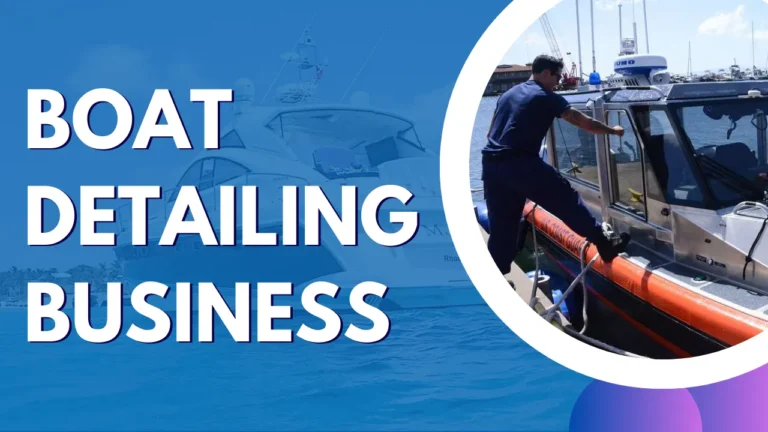Are you looking to simplify the journey of travelers, tourists, and passengers and want to set up a business in the travel industry? So, luggage delivery can be the right opportunity.
Luggage delivery services provide convenient luggage transportation from one destination to another, and their popularity is growing in many regions in travel segments.
Read the forecast report and key players in the luggage delivery service market.
Visit: (OpenPR Website).
If you can provide a hassle-free, professional luggage delivery service to travelers and tourists, this business can be profitable; start with proper planning and research.
In this guide, we’ll discuss the essential steps and the business overview that are helpful for beginners to learn and provide a clear understanding of the service model.
How does luggage delivery service work?
Before starting the business, let’s know that how luggage delivery services work and the process. It is necessary to know about service type.
- Service model: Transport luggage from one physical address to another.
- Pick-up/Drop-off: Airports, homes/offices, hotels/resorts, stations/stops (+more).
- Target Audience: Travelers (especially flying/long trips), people with disabilities, movers, oversized item senders.
For travelers and tourists, it is a suitable service for physically transporting luggage from one place to another; many companies are providing the service.
With luggage delivery services, travelers can save time and effort. The service company picks up the bags from the customer’s doorstep and takes them to their destination.
Businesses focus on airports, bus stands, and train stations and deliver the customer’s luggage to their destination (Home, Hotel, Resort, farmhouse, or another place).
Key features provided by luggage delivery service:
- Convenient door-to-door service
- Live tracking for real-time updates
- Safe and reliable handling
- Comprehensive insurance coverage
- Global access to any destination
- Flexible delivery time options
- User-friendly booking experience
- Responsive customer support
- Transparent pricing
- Personalized service option
By starting the service, you can help travelers, tourists, and many people, also, it is the best solution for travelers who want to avoid carrying their heavy bags with them.
Pros and cons of starting the business:
Pros:
- Low startup costs
- Rewarding work
- High customer retention rates
- Pick and choose clients.
- Control of workload
- Gain experience
- Unlimited income potential
Cons:
- Inconsistent income
- High competition
- Need for a vehicle
- Physically demanding
- Long hours
- Risk of damage to luggage
Many people have concerns about luggage delivery/shipping, particularly regarding safety, reliability, target market, and costs.
These services are offered for international and domestic travel, but the process, target market, and pricing differ significantly.
- Domestic shipping/local delivery service is typically simpler and faster, ideal for short trips or avoiding airline baggage fees. The service operates within a specific route and provides a luggage delivery facility with a vehicle.
- International shipping often involves customs clearance and complex regulations, catering to travelers moving abroad or sending large items.
You need to understand the concept of both models and choose the suitable idea to start.
| Aspect | Domestic shipping | International shipping |
|---|---|---|
| Geographic Scope | It operates in a specific area, such as a city, airport, bus stop, train station, etc. | Can transport luggage over longer distances (between countries and continents) |
| Services Offered | Fast, convenient, with less time | Offers a wider range of transportation services (ground and air transportation) |
| Timeframe | Quick service and same-day delivery | It can take a long time, depending on the distance |
Conclusion: We’ve provided the given difference for a good understanding.
However, you should focus on providing domestic or local luggage delivery service because it is easy, can be less competitive, and is best for new businesses.
You could consider partnering with existing transportation or delivery companies instead of starting from scratch.
How to start a luggage delivery business? steps
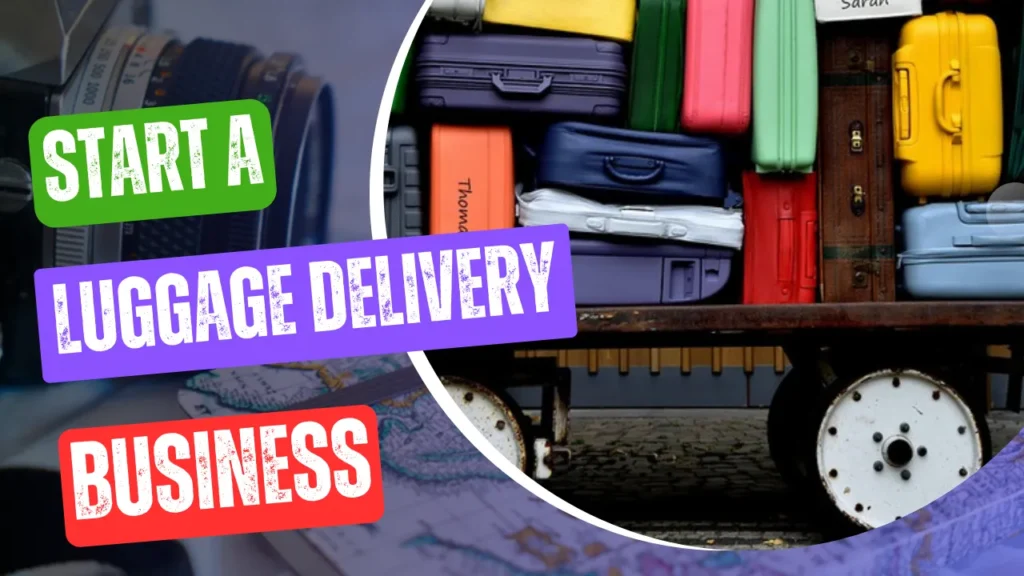
1. Market research and planning.
Conduct extensive market research to identify and identify the right target demographic and potential customers for efficient luggage delivery services.
Understand the market needs, competition, growth, and target location, and analyze other related services to create a service plan. – such as delivery setup, pricing, customer service, booking, etc.
What should you research?
- The local market potential
- Analyze existing competitors
- Find nearby travel hubs
- Identify travelers problems
- Know the competitor’s service.
- Research on the pricing chart
Who are your target customers:
Most business travelers have a busy schedule and don’t have much time to drop off and pick up their luggage at the airport to their destination, so they also want delivery service.
Your next target should be families who have children and often have a lot of luggage to travel with; find the right spot and attract those types of customers to your service.
Luggage delivery is not only for those specific customers; most travelers prefer a delivery service to keep their luggage with them. Here are some ideas for target customers:
- Business travelers,
- Vacationers,
- Cruise ship passengers
- International travelers
- Luxury travelers
- Elderly or disabled travelers,
- Event attendees,
- Students and families.
Target places:
- Airports,
- Hotels,
- Conference centers,
- Tourist destinations,
- Train stations,
- Cruise ports,
- Educational institutions,
- Convention centers,
- Residential areas,
- Business districts.
After finding the customer, you can provide luggage delivery service from home to airport or from airport to home, for which you must have a proper booking system.
2. Develop a luggage delivery business plan

Building a successful business requires a proper plan and research; when you start a business, first, prepare a strategic and well-researched plan.
An effective business plan is important to ensure the smooth and organized execution of all operational activities. So, do thorough research and careful groundwork before starting with a long-term perspective.
Every business has its goals, strategy, and purpose behind the services; similarly, to successfully progress on the right track of your startup journey, a strategic business plan is necessary.
Research, understand every side of the business idea, and structure your plan.
Benefits of a business plan:
- Clarity and focus to make the right decision
- Provide a road map and keep you on track.
- Financial planning and funding benefits
- With a plan, you can differentiate yourself.
Prepare a written document, including the requirements of your business:
- Executive summary: The section includes market analysis (industry, local competition, SWOT, and opportunity), as well as a detailed overview of the service.
- Company profile: Prepare your luggage delivery company profile, including (company name, service model, mission, vision, and unique value proposition).
- Operation plan: Outline the business operations (logistics, delivery, technology for booking, pricing, coverage liability, etc).
- Marketing strategy: With a great pricing strategy, outline the marketing methods and customer retention plan.
- Team or staffing: For proper service management, team members are the key part; include their profiles, experience, and qualifications.
- Financial planning: Develop a financial plan calculating the startup costs and operational expenses and finding funding sources.
Resources to learn:
To learn the process of creating a business plan you can read blog posts.
- Winning plan for delivery service
- Explore Bplans templates
3. Come up with a business name.
Define your business name that should be attractive, short, easy to remember, unique, service-related, web-friendly, non-copyrighted (not already being used), and easily pronounceable.
Choosing a business name is an important step for every startup; an online presence is vital for building customer trust in the digital era.
So, naming your business is the first step before you plan for an online presence (website, social media, local SEO).
Find suitable names, and decide the best one, ensure proper research is necessary.
Analyze related businesses and their brand names to get some idea. Also, you can use business name generator tools to create some unique names.
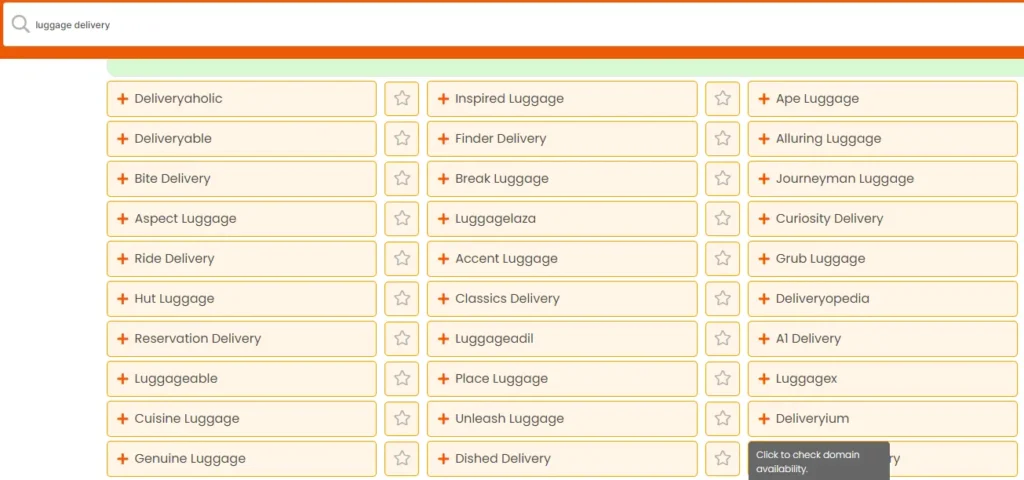
Search on “Google” to get the list of names, making sure the name is error-free, or if that aligns with your goal, select it.
Once you decide, check for domain availability to register a (.com); a domain is a web address (for a website). A popular registrars (Namecheap.com or Godaddy.com) is the best.
4. Secure necessary licenses and permits
Before starting luggage delivery, check with your local and state regulations to comply with the necessary registration, licensing, and permits.
- Business registration: Choose and register your business (sole prop, LLC, etc.)
- Licenses and permits: Research and obtain necessary permits for transportation and airport operations (if applicable).
- Insurance: Get general liability and cargo insurance.
- Contracts and terms: Create clear service terms.
- Tax compliance: Follow federal, state, and local tax regulations.
- Employment laws: Comply with labor laws if you hire employees.
- Local regulations: Stay updated on specific rules in your area.
The legal registration and requirements depend on location, business size, and specific rules.
Register your business:
Registering the business is crucial for startups with proper documentation and choosing the right type of business entity such as – Solepropritership, Partnership, LLC, or corporation.
In the previous section, we discussed choosing a business name, so before registering your business, decide on a business name and logo.
Most startups register their business as a Limited liability company (LLC); however, depending on your needs and tax benefits, you can select the suitable structure.
Also, other business entities you can consider; make sure to consult a legal advisor/consultant for help and to understand the necessary formalities.
Obtain license and permits:
Obtain necessary licenses and permits to operate a transportation-related business (may vary by city/state). Specific legalities depend on location or business size, so the best would be to consult your local authorities.
Get business insurance:
Next, you must obtain business insurance to cover and protect your venture against liability claims, damages, and losses. The luggage delivery service uses different equipment and a vehicle, for which it is very important to get insured.
- General Liability
- Commercial Auto (Covers delivery vehicles and drivers)
- Workers’ Compensation (if you are hiring employees).
Also, to be protected from all types of losses occurring in the business, you may need to take other specific types of insurance. Connect with an insurance agent for guidance.
With all those requirements, you must take care of other legal needs.
5. Develop a delivery process
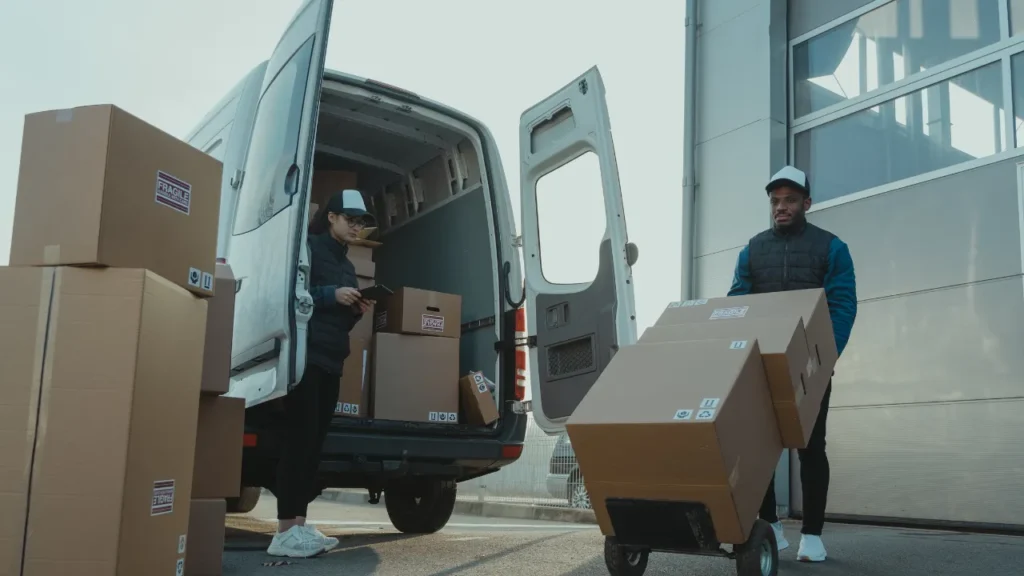
Develop a proper and efficient delivery process; this is the primary part of the delivery service.
A clear workflow setup, proper facility, resources, a good staff, and reliable digital (booking, tracking, payment) systems are important.
Also, route planning, vehicle, pickup, and delivering the luggage with painting the time frame are necessary for the delivery process.
The general or basic process of the service:
1. Define your service:
- Target audience: Airport travelers, cruise passengers, business travelers, or a combination. You can target each type of customer, focusing on their needs.
- Service area: Target local, regional, or national audiences.
- Luggage types: Standard suitcases, sports equipment, and other items.
2. Develop the procedures:
- Booking: Online booking through mobile app and phone calls.
- Pickup: Collect luggage from designated points (airports/hotels).
- Delivery direct to the residence, hotel, and event venue (depending on the customer).
- Luggage handling: Labeling, secure storage, tracking, etc.
- Communication: Updates on status delivery notifications.
3. Operations:
- Technology: Booking platform, tracking software, dispatch system.
- Build a network: Partner with couriers, drivers, or logistics companies.
- Packaging: Provide secure options for different luggage types.
- Set clear guidelines: Define weight limits, prohibited items, and damage policies.
4. Prioritize security and safety:
- Provide insurance: Protect against loss, damage, or theft.
- Background checks to ensure responsibility and trustworthiness.
I hope you understand the process of luggage delivery and the service model.
To become successful, focus on providing a great customer experience, transparent pricing structure, offer booking, tracking, and schedule change-like options.
6. Equipment and technology for service
The right equipment and technology is necessary for the company to provide secure, safe, efficient, and the best luggage delivery services to customers.
Carefully purchase the right vehicle that can handle the job efficiently and also focus on providing safe and secure luggage delivery.
Prepare a list of the necessary equipment, tools, and supplies.
Here are a few requirements to run a luggage delivery service. However, do your research for arranging the necessary supplies.
- Vehicles (for delivery): You can purchase (cars, vans, trucks, or trailers) and focus on delivery locations, business size, budget, and other needs.
- Carts, dollies, straps, and locks for safety handling.
- Packaging for different luggage types – padded bags, straps, shrink wrap, etc.
- Smartphones/tablets for booking, tracking, and communication.
- Online/mobile app for booking, managing, and tracking.
- Real-time tracking for customers and staff.
- Choose the best and most secure payment options.
- Cameras and GPS tracking for security purposes.
- CRM software: For customer building customer relationships.
7. Hire Staff and employees
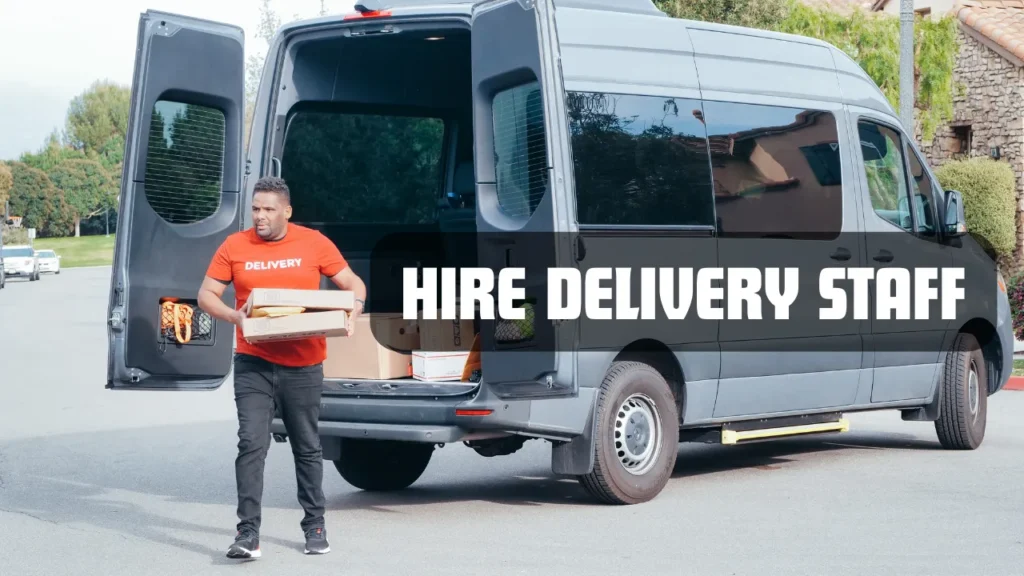
Creating a staff/team for your luggage delivery business is Important; with a skilled team, you can easily and efficiently run your delivery service properly.
Build a proper team, hire skilled persons with good driving and route experience in the targeted area, and hire other helper staff to manage the service.
When you hire, check their skill level (driving experience, communication skills, and behavior).
Also, according to roles, tasks, and responsibilities, you need to know your staff qualifications, license validity (for drivers), clean background records, etc.
A basic staff for your business:
- Delivery drivers
- Dispatchers
- Customer service representatives
- Administrative Staff
- Marketing staff
- IT staff
Build a good relationship with your staff, and think about their freedom and working process.
8. Launch with a proper marketing plan
To succeed in the competitive market, having a solid marketing strategy will play a key role, so start building a great market plan by identifying the right customer, their specific needs, and their location.
An online marketing strategy would be best to create awareness about the luggage delivery service with the potential target audience.
Social media marketing, search engine optimization (SEO), digital or paid advertising, and video promotion are effective and proven ways to reach customers.
Don’t forget to partner with travel agencies, hotels, resorts, airlines, and cruise lines because it can be a powerful growth strategy.
Your service, pricing, and great customer experience will help to build a strong reputation and generate positive word-of-mouth recommendations.
Prepare marketing strategy:
Here are some ideas of marketing you can follow for promotion.
- Digital marketing strategy
- Create a business website.
- Promote your service on social media.
- Content marketing: (readable, visual content, podcast),
- Paid marketing: (PPC, Ads, influencer marketing)
- Print advertising, outdoor promotion,
- Word-of-mouth, print, banner, newspaper ads, etc.
Through this blog post, we explained how you can start a business and all the related information. I hope you got the point and learned something from this post.
Frequently Asked Questions (FAQs)
How much do luggage delivery drivers make?
As a luggage delivery driver, you can make a good income; many luggage delivery drivers in the United States make an average of $49,000 annually. You can check the salary and income report – at GlassDoor.com.
Is luggage pickup and delivery service worth it?
Yes, starting a luggage pickup and delivery service is worth it, still depends on your business plan, market demand, and competition. Before starting the venture, research and proper planning are necessary to enter a competitive market.
How much does it cost to start a luggage delivery business?
There is no fit answer for the questions because the startup cost depends on many factors; when you start a luggage delivery business, requirements are needed, such as – buying a vehicle, necessary equipment, licensing, insurance, marketing, website setup cost, etc.
General cost range from $6,000-$35,000 (average), including:
-Business registration and licensing: $500-$1,000
-Insurance: $2,000-$5,000
-Marketing and advertising: $1,000-$5,000
-Technology platform: $500-$5,000
-Vehicle costs (ownership or rental)
Consult a business consultant and connect with similar businesses to understand the requirements.
Can you make money delivering lost luggage?
It is possible to make money delivering lost luggage, but success hinges on finding efficient operations, competitive pricing, and legalities. Careful planning and finding the target customer is key.
Wrapping Up
In this post, we’ve discussed the essential steps of starting a luggage delivery business. Conduct your research and understand the local market, demand, and competition to stand out.
You can build a brand in the market by setting up the business strategically and providing the best services. Focus on airports, bus stands, and stations to deliver customers’ luggage to their destination.
I hope the blog post is helpful; if there are any other doubts, comment to us.
Related blog posts:





